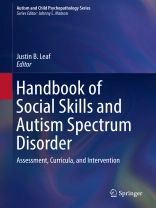This handbook identifies the various social deficiencies widely associated with children and youth diagnosed with autism spectrum disorder (ASD). It discusses possible causes as well as the lifelong effects if these deficiencies are not addressed. The handbook presents current behavioral and curriculum-based methods for assessing social deficits. Chapters examine the various interventions that have been used to improve social skills and behavior, including video modeling, peer-mediated interventions, and script fading. Chapters also assess various interventions using empirically based procedures, evaluate the research of each of these procedures, provide guidelines for treatment planning, and offer clinical recommendations. The handbook concludes with future directions for the development of both social behavior and clinical social skills interventions.
Topics featured in the Handbook include:
- Impairments in social behavior that may result in negative outcomes such as depression, loneliness, and suicide in individuals with ASD.
- Bullying among youth with ASD.
- Behavioral skills training to promote social behavior of individuals with ASD.
- The Early Start Denver Model approach to helping young children with ASD.
- The implementation of social skills groups for individuals diagnosed with ASD.
The Handbook of Social Skills and Autism Spectrum Disorder is a must-have resource for researchers, clinicians/professionals, and graduate students in clinical child, school, and developmental psychology, behavioral therapy, and social work, as well as such interrelated disciplines as child and adolescent psychiatry, rehabilitation medicine/therapy, pediatrics, and special education/educational psychology.
Innehållsförteckning
Chapter 1. An Introduction to the Handbook.- Part I: Social Skills Deficits .- Chapter 2. Understanding the Social Nature of Autism: From Clinical Manifestations to Brain Mechanisms.- Chapter 3. Have a Happy, Fun, Assertive Life! (Avoid Depression, Anxiety, Loneliness, and Suicide!).- Chapter 4. Bullying Among Youth with Autism Spectrum Disorder.- Chapter 5. Friendship in Autism Spectrum Disorder.- Part II: Assessment .- Chapter 6. Standardized Assessment of Social Skills in Autism Spectrum Disorder.- Chapter 7. Assessment of Adaptive Behavior and Autism Spectrum Disorder.- Chapter 8. Curriculum Based Assessment of Social Development: Goal Selection and Sequencing.- Part III: Social Skills Interventions .- Chapter 9. Evidence-Based Interventions.- Chapter 10. Discrete Trial Teaching and Social Skill Training: Don’t Throw the Baby out of the Bathwater.- Chapter 11. Incidental Teaching: Happy Progress.- Chapter 12. Pivotal Response Treatment: Empirically Supported Strategies to Target Social Competencies and Motivation in Individuals with ASD.- Chapter 13. Helping Young Children with Autism Spectrum Disorder Develop Social Ability: The Early Start Denver Model Approach.- Chapter 14. Video Based Instruction for Learners with Autism.- Chapter 15. Visual Learning Strategies to Promote Independence and Appropriate Social Behavior.- Chapter 16. Peer Mediation Interventions to Improve Social and Communication Skills for Children and Youth with Autism Spectrum Disorder.- Chapter 17. Parent-Mediated Interventions for Social Communication in Young Children with ASD.- Chapter 18. Using the Teaching Interaction Procedure to Teach Social Skills for Individuals Diagnosed with Autism Spectrum Disorder.- Chapter 19. Behavioral Skills Training to Promote Social Behavior of Individuals with Autism.- Chapter 20. Behavioral Skills Training to Promote Social Behavior of Individuals with Autism.- Chapter 21. Matrix Training Procedures.- Chapter 22. Social Stories™: A Cautionary Tale.- Chapter 23. Emerging Social Skill Interventions for Individuals with Autism.- Part IV: Future Directions .- Chapter 24. Future Research Directions as it Relates to Social Behavior for Individuals Diagnosed with Autism Spectrum Disorder.- Chapter 25. Future Directions for Clinical Social Skills Interventions.
Om författaren
Justin B. Leaf, Ph.D., BCBA-D., is the Director of Research and Training for the Autism Partnership Foundation (APF) and for the Center for the Advancement of Behavior Analysis™ (CABA). Dr. Leaf is also an Adjunct Professor at Endicott College. Dr. Leaf received his doctorate degree in Behavioral Psychology from the Department of Applied Behavioral Science at the University of Kansas. He worked under the mentorship of Drs. James Sherman and Jan Sheldon. Currently, he leads the research team at APF, which conducts research projects nationally and internationally. His research interests include examining methods to improve social behaviors and, more importantly, develop meaningful friendships for children and adolescents diagnosed with autism, comparing different teaching methodologies, evaluating parameters of reinforcement, and evaluating long-term outcomes for individuals diagnosed with autism. Dr. Leaf has over 50 publications in peer-reviewed journals or book chapters and has presented at national and international professional conferences and invited events. He is an Associate Editor for the Review Journal of Autism and Developmental Disorders and serves or has served on the editorial boards for the Journal of Autism and Developmental Disorders, Education and Training in Autism and Developmental Disorders, and the Journal of Applied Behavior Analysis.












